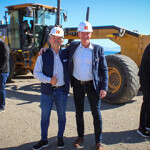Alaska's Murkowski joins Pebble Mine critics

Opponents of the proposed Pebble Mine in Bristol Bay, Alaska applauded U.S. Senator Lisa Murkowski (R-AK), who last week stood behind language critical of the U.S. Army Corps of Engineers’ Draft Environmental Impact Statement (DEIS) on the proposed open-pit copper, gold, and molybdenum mine that would sit near critical headwaters that feed the Bristol Bay fishery.
These new criticisms appeared in an appropriations bill from the Senate Interior, Environment, and Related Agencies Appropriations Subcommittee, which Murkowski chairs. The bill aligned the committee in support of concerns regarding technical deficiencies in the DEIS raised by the Environmental Protection Agency (EPA), the Department of the Interior (DOI), and the National Marine Fisheries Service (NMFS).
“The committee shares the agencies’ concerns that the DEIS lacks certain critical information about the proposed project and related mitigation and therefore underestimates its potential risks and impacts,” the bill reads.
The appropriations bill calls for “sound science” to be applied to the project and states that the Army Corps must correct “gaps and deficiencies” in the DEIS and address the concerns of Alaska Natives. Furthermore, it encourages the Army Corp to work with the EPA, NMFS, and the Alaska Department of Fish and Game to assess the impact the mine might have on Bristol Bay’s fishery, which is home to the world’s largest sockeye salmon run. It concludes by encouraging federal agencies to exercise their “discretionary authorities” if they are unsatisfied with the Army Corps’ impact assessment, and cites in particular the EPA’s enforcement authority under the Clean Water Act.
The DEIS has come under intense scrutiny from native organizations, environmental groups, federal agencies, biologists, and both commercial and sport fishermen since it was released in February. Opponents say the Pebble DEIS is a slapdash attempt to ram the mine through the state and federal permitting processes while both governments are led by administrations backing an expansion of resource extraction projects in the United States and Alaska in particular.
“For nearly two years, the people of Bristol Bay have watched in horror as the Army Corps rushed through its review of Pebble, ignoring the devastating impacts the project could have in our region simply because of politics,” said Ralph Andersen, president and CEO of the Bristol Bay Native Association, a nonprofit promoting social, economic, cultural, and educational initiatives benefitting the Bristol Bay’s Alaska Native population. “The language in the appropriations bill sends a clear message that this is not appropriate behavior from a federal agency. This is an important step in stopping the sham review process currently underway, and we look forward to seeing the senator continue to hold them accountable for the robust public process and scientific review that this region deserves.”
Among a litany of complaints about the DEIS, the Bristol Bay Native Association and other mine opponents say it does not take into account scientific assessments about the impact of the mine, and that it contains estimates for a mine of a far smaller size than the Pebble Mine’s plans indicate will be developed.
Norm Van Vactor, the president and CEO of the Bristol Bay Economic Development Corporation, said he is deeply concerned about the potential environmental impacts of the mine, especially considering Bristol Bay just completed the most lucrative season in the fishery’s 129 years of recorded history.
“After a record-breaking salmon season in Bristol Bay, we’re glad to see elected leaders standing up for our fishery and all it sustains. Bristol Bay has said time and time again that we will not trade our world class fishery for a gold mine. The Army Corps needs to start listening to our concerns, and to the scientists who have pointed out major flaws in Pebble's plan,” Van Vactor said.
Representatives from the United States Tribes of Bristol Bay, Trout Unlimited, and a local sport fishing lodge also commended Murkowski, according to the press release.
Despite intense pressure from Pebble opponents, Murkowski had been hesitant to take sides on the mine. But two weeks ago in Washington D.C., speaking at an event for Bristol Bay Salmon Week, Murkowski said the widespread science-based criticisms of the mine were justified.
“If the science out there that has been raised by these agencies can’t demonstrate that you can have a successful mining project in an area that is as sensitive as the Bristol Bay watershed then a permit should not be issued," she said in video released by the Environmental Investigation Agency. “We all need to be able to believe that the science that drives the process can be trusted.”
Photo courtesy of U.S. Environmental Protection Agency






Share